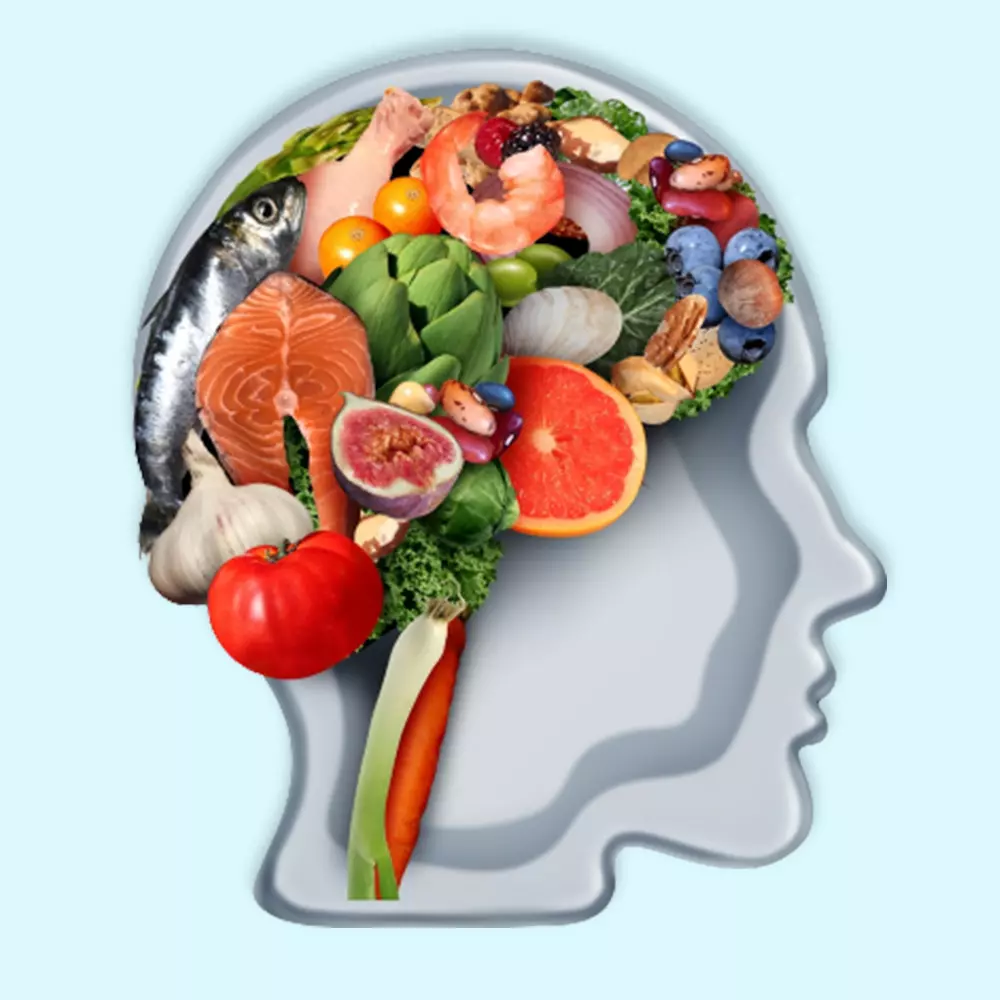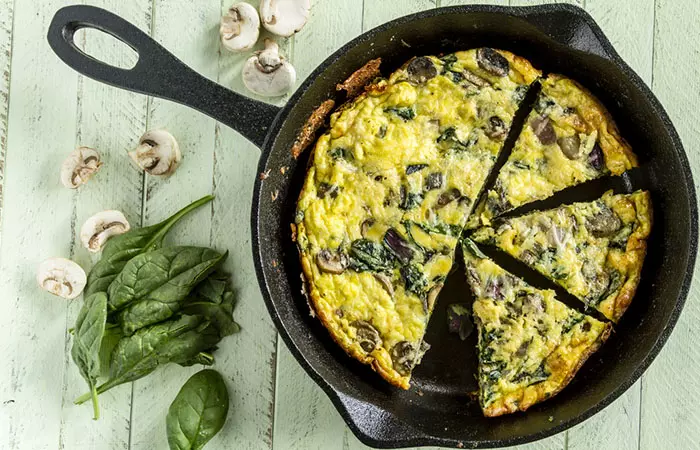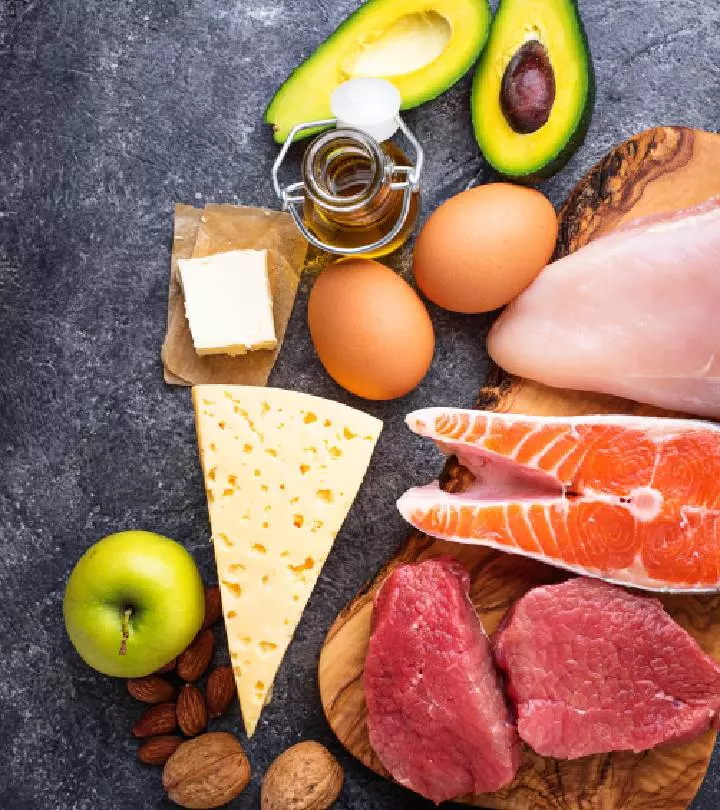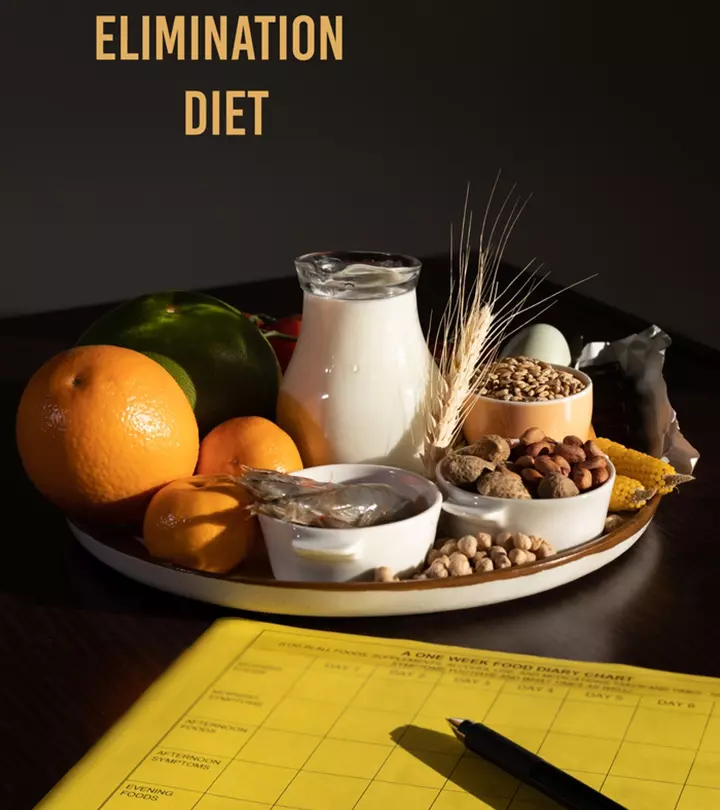MIND Diet: How It Works, Food List, Recipes, And Risks
Elevate your cognitive power by nourishing your brain with the right food.

Image: Shutterstock
In an era where mental and cognitive health is more important than ever, the MIND diet emerges as a new hope for enhancing your brain power. This diet plan is derived from the Mediterranean and DASH diets. It focuses on the intake of certain brain-boosting foods while limiting others to help reduce the risk of neurodegenerative diseasesi A wide range of conditions characterized by the progressive death of neural cells in the nervous system. and promote cognitive health. In this article, we have listed foods to include in your diet, how the MIND diet works, its benefits, associated risks, a sample diet plan, and recipes. Read on!
 At A Glance
At A Glance- Principle: A combination of Mediterranean and DASH diets that is rich in healthy fats and fiber and low in sodium.
- Purpose: To improve brain health and reduce the risk of neurodegenerative diseases.
- Who It Is For: People showing signs of cognitive impairment.
- Duration: Long-term
- Who Should Avoid: People with celiac disease or lactose intolerance.
- Cons: Heavy focus on foods that people are commonly allergic to, like seafood and nuts.
In This Article
What Is The MIND Diet?
MIND stands for Mediterranean-DASH Diet Intervention for Neurodegenerative Delay. This diet plan is designed to promote brain health and reduce cognitive declinei The gradual decline of cognitive abilities, such as memory, attention, and thinking. (1). It is a hybrid of the two healthy diets, the Mediterranean diet and the DASH (Dietary Approaches to Stop Hypertension) diet. These diets also improve heart health, reduce the risk of diabetes, and lower blood pressure (2), (3), (4).
Over time, researchers integrated the key elements of both diets that seemed to have a great impact on brain health. This resulted in the MIND diet plan that includes foods that are rich in nutrients, antioxidants, and healthy fats to support brain health and reduce the risk of neurodegenerative diseases like Alzheimer’s and dementiai A range of cognitive impairments that affects a person’s thinking, memory, and ability to perform daily activities. . But, why is there so much emphasis on brain health?
According to a 2022 report by the Alzheimer’s Diseasei A progressive brain disorder that slowly deteriorates cognitive skills and memory and is characterized by behavioral changes. Association, as many as 6.2 million people in the United States alone have Alzheimer’s disease (5). Evidence indicates that the MIND diet lowered the risk of this condition by 53% in participants who strictly followed it and by approximately 35% in those who practiced it moderately (6).
 Trivia
TriviaBut how does this diet plan work to boost brain health? Find out in the next section.
How Does The MIND Diet Work?
The MIND diet mainly focuses on the consumption of plant-based foods, while limiting the intake of foods high in saturated fats and added sugars. The intake of foods that are rich in essential nutrients (B vitamins, magnesium, iron), antioxidants (vitamin C, flavonoids, polyphenols), and healthy fats (omega fats) help protect and nourish the brain. Consuming nutrient-rich foods and following specific diet plans may help fight against the oxidative damage and inflammation associated with cognitive decline (7), (8), (9), (10).
The antioxidants available in foods that make up these diet plans help protect the brain cells from free radical damage (11), (12). They also help prevent beta-amyloid plaque formation in the brain, which is the primary cause of brain cell death or Alzheimer’s disease (13). In addition, the omega fats in these healthy foods exhibit anti-inflammatory activity that helps lower inflammation in the brain (14), (15).
The MIND diet mainly focuses on 15 dietary ingredients to eat or avoid. The following section will give you an idea of the MIND diet foods list.
Foods To Eat On The MIND Diet
The ten types of food people following this diet can eat include:
1. Berries: Blueberries and strawberries are rich in flavonoids, especially anthocyanidins, that may help improve cognitive ability by reducing oxidative stress and inflammation (16), (17). Including them in your diet may help reduce, and even reverse, cognitive decline as they have antioxidant and anti-inflammatory properties. Try to eat a handful of berries at least twice a week.
2. Leafy Greens: Consumption of green leafy vegetables, such as kale, spinach, and lettuce, may help slow down the decline of cognitive abilities in old age. Leafy greens are rich in vitamin K, lutein, β-carotene, nitrate, folate, kaempferol, and α-tocopherol that slow down the cognitive decline process (18). Aim to eat a minimum of 6 servings (½ cup, cooked) of leafy greens per week.
3. Nuts: A study showed that people who consume more than 70 g/week of nuts had a 17% lower risk of cognitive impairment compared to non-consumers. Antioxidants, in the form of nutrients like vitamin E and non-nutrients such as polyphenols present in the nuts, can positively affect cognitive functioning (19). Consume at least five servings (30 g) of nuts such as almonds, pistachios, and walnuts per week.
4. Whole Grains: Consumption of whole grains may prevent a decline in cognition (20). Whole grains are rich in non-nutrient phytochemicals like flavonoids, carotenoids, and phytosterols that play a key role in reducing cognitive decline (21). Try to include whole grains such as oatmeal, quinoa, rye, and brown rice in at least three servings (16 g) per day.
5. Beans: The nutrients available in beans help improve brain function. They contain low levels of zinc, and the intake of food low in zinc may help reduce cognitive delay in the elderly (22). Include beans, such as kidney beans, black beans, and pinto beans, in at least four meals per week.
6. Vegetables: The intake of vegetables is inversely associated with the prevalence of cognitive disorders. Vegetables are rich in a variety of antioxidant nutrients that act against oxidative stress and help reduce cognitive decline (23). Eat vegetables like cabbage, carrots, broccoli, and okra at least once (77 g) per day.
7. Fish: A higher intake of fish is associated with a lower risk of neurodegenerative disorders like dementia (24). Fish fatty acids like EPA (eicosapentaenoic acid) and DHA (docosahexaenoic acid) are also being studied for their potential in treating Alzheimer’s disease and major depression (25). Add fish, like tuna or salmon, to your diet at least once a week.
8. Poultry: A moderate intake of lean cuts of poultry (chicken) helps reduce the risk of cognitive decline. Chicken contains dietary protein and essential amino acids that may have a protective effect on cognitive functioning. Also, it may help reduce beta-amyloid deposition in the brain, which is associated with cognitive impairment (26). Eat poultry twice a week, and try having steamed or smoked meat instead of frying or grilling it. Do not over-consume poultry as it also contains saturated fats.
9. Wine: Wine consumption in moderation has been associated with a reduced risk of cognitive impairment. Red wine contains flavonoids that reduce the incidence of Alzheimer’s disease and cerebrovascular disease. It also contains resveratrol, which has neuroprotective and anti-neuroinflammatory properties that may help prevent cognitive decline (27). Do not consume more than one glass a day or 30 g for men and 20 g for women.
10. Olive Oil: Oleuropein-aglycone, a phenolic compound present in olive oil, has a neuroprotective effect that acts against cognitive decline and aids memory and behavioral functions (28). Use extra virgin olive oil to cook your food or as dressing for salads.
The MIND diet recommends avoiding or limiting certain types of food that are believed to be less beneficial for brain health. Scroll down to learn about them.
Foods To Avoid On The MIND Diet
Here are some foods to limit on the MIND diet (29):
- Fast Food (French fries, fried chicken, chicken nuggets): Limit your consumption to less than one serving (100 g) per week.
- Red Meat (pork, ground beef, lamb): No more than four servings (3 oz) per week.
- Butter: Less than one tablespoon daily.
- Cheese: Less than one serving (2 oz) per week.
- Pastries And Sweets: No more than five times per week.
Planning your meals according to your dietary requirements makes the whole process more effective. The following sample 7-day meal plan can give you a clear idea.
7-Day MIND Diet Meal Plan
This 7-day MIND diet meal plan focuses on including foods that are rich in nutrients and beneficial for brain health.
| 7-Day MIND Diet Meal Plan |
|---|
Day 1
|
Day 2
|
Day 3
|
Day 4
|
Day 5
|
Day 6
|
Day 7
|
 Did You Know?
Did You Know?This is a sample MIND diet 7-day plan you can experiment with on a daily basis to boost your cognitive health. But, does this plan also help with weight loss? Scroll down to know more.
Can I Lose Weight On The MIND Diet?
Anecdotal evidence suggests that following the MIND diet may help you lose weight. While this diet mainly boosts your brain health, the foods included in this diet are high in healthy nutrients and proteins and low in fats, which may help you burn some calories. Additionally, protein-rich food like fish helps you stay energetic throughout the day. A reduction in the consumption of highly processed foods may also aid in weight loss. However, limited evidence is available in this regard.
Scroll down to the next section to take a look at some delicious MIND diet recipes you can incorporate into your daily routine.
MIND Diet Recipes
1. Blueberry-Walnut Pancakes
Ingredients
- ½ cup of frozen blueberries
- 2 cups of buttermilk
- 3 teaspoons of unsalted butter
- 1 large egg
- 1 teaspoon of baking soda
- ½ teaspoon of salt
- 13/4 cups of whole-wheat flour
- 1½ teaspoon of baking powder
- 1/3 cup of chopped walnuts
How To Prepare
- Whisk the buttermilk and egg together in a medium-sized mixing bowl.
- Combine the flour, baking powder, baking soda, sugar, and salt in a separate bowl.
- Gently stir the buttermilk mixture into the flour mixture until thoroughly combined.
- Mix the melted butter into the batter.
- Allow the batter to rest for a minimum of 15 minutes or refrigerate it overnight.
- Melt a tablespoon of butter in a skillet over medium heat until it starts to sizzle.
- Pour approximately 1/4 cup of batter per pancake onto the skillet.
- Turn the heat to low and immediately place 5-6 blueberries and 3-4 walnut pieces on each pancake.
- Using a spatula, carefully flip the pancakes to cook the other side.
2. Grilled Chicken Sandwich
Ingredients
- 4 sesame seed buns
- 1½ pounds of chicken breasts
- ¼ cup honey mustard sauce
- 5-6 lettuce leaves
- 1 tomato (sliced)
- 1 onion (sliced)
For The Marinade
- 1 teaspoon of garlic powder
- 3 tablespoons of vegetable oil
- 2 tablespoons of apple cider vinegar
- 1 tablespoon of dijon mustard
- 1 tablespoon of brown sugar
- ½ teaspoon of salt and pepper each
How To Prepare
- Flatten the chicken breasts to a thickness of approximately half an inch.
- Mix the marinade ingredients in a bowl or freezer bag. Add the chicken and toss well.
- Let the chicken marinate for at least 30 minutes (or a maximum of 4 hours).
- Preheat the grill to medium-high heat.
- Grill the chicken for 5-6 minutes per side.
- Toast the buns, then spread honey mustard on them.
- Layer the lettuce leaves, tomato slices, and onion slices on the bun.
- Top the buns with the grilled chicken and serve.
3. Spinach Frittata
Ingredients
- 5 cups of baby spinach
- 2 tablespoons of extra virgin olive oil
- 8 large eggs
- ¼ cup of fresh chopped basil
- 1/3 cup of heavy cream
- ¾ cup of thinly sliced onions
- ½ teaspoon of salt
- ¼ teaspoon of freshly ground black pepper
- ¾ cup of shredded cheddar cheese
- ½ cup of parmesan cheese
How To Prepare
- Preheat the oven to 325°F (163°C).
- Heat the oil in a 10-inch cast iron or ovenproof nonstick skillet over medium heat.
- Cook the onions for around 3-4 minutes until softened.
- Add half of the spinach and cook for about a minute until it wilts down.
- Add the remaining spinach and ¼ teaspoon of the salt and continue cooking until all the spinach is wilted.
- In a large bowl, whisk together the eggs, heavy cream, pepper, and the remaining ¼ teaspoon of salt.
- Add the cooked spinach mixture, cheddar cheese, parmesan cheese, and basil to the egg mixture and stir to combine.
- Pour the mixture back into the pan, then place it in the oven. Bake until it sets (20 to 23 minutes) and serve.
Not all diets have the same benefits, dietary recommendations, and patterns. Scroll down to learn how the MIND diet differs from other diet plans.
How Does The MIND Diet Differ From Other Diet Plans?
The MIND diet offers precise recommendations for what foods to consume and what foods to avoid in order to keep the brain in good health. It recommends consuming ten types of food that slow down cognitive decline while limiting five unhealthy groups that may speed up brain health deterioration. It is different from other popular dietary plans, like paleo diet and keto diet, which are more restrictive. In contrast, the MIND diet focuses on a higher intake of foods that are good for the brain and is not overly restrictive. As a result, you are still able to enjoy your favorite foods in moderation.
Following the MIND diet reduces the risk of cognitive decline and related disorders. But, are there any risks associated with it? Scroll down for the answer.
Risks Associated With The MIND Diet
There are no known risks associated with the MIND diet. However, anecdotal evidence suggests that some foods in the MIND diet plan may not be suitable for everyone due to food intolerance, allergies, or dietary restrictions. Hence, it is always advisable to check with a healthcare professional before following any dietary plan to figure out whether it is appropriate for you.
The MIND diet (Mediterranean-DASH Diet Intervention for Neurodegenerative Delay) encourages the intake of brain health-boosting foods and limits less healthy options. This dietary pattern promotes cognitive health and reduces the risk of neurodegenerative diseases like Alzheimer’s and dementia. However, if you are allergic to certain foods on the MIND diet or have any dietary restrictions, it is important to consult your nutritionist before you start this diet. Remember to plan your meals ahead of time so you can prep and store your food for the week, making it easier to stick to the diet.
Infographic: Foods To Include In The MIND Diet
The MIND diet, which combines the Mediterranean and DASH diets, places an emphasis on foods that are good for the brain. We have rounded up the foods to include in this diet along with serving sizes in the infographic below. Scroll down to check it out!

Illustration: StyleCraze Design Team
Frequently Asked Questions
Can you drink coffee on the MIND diet?
Yes. You can drink coffee on the MIND diet. Coffee contains caffeine, an antioxidant with neuroprotective properties (31). However, take it in moderation and with little or no sugar.
Can you eat potatoes on a MIND diet?
Yes, you can eat potatoes while following the MIND diet. However, opt for sweet or purple potatoes over the white variety and avoid frying them. Also, practice portion control to avoid eating them in excess.
Is the MIND diet suitable for everyone?
Though the MIND diet is generally recommended for those with cognitive issues, it can also be followed by those with heart issues, cancer, or diabetes. It can be followed by anyone who wants to focus on improving their brain health. It may also be suitable for those with depression and anxiety (32). However, before starting this diet, consult your nutritionist to ensure it aligns with your medical history and conditions. It is important to review your health background thoroughly with your nutritionist for suitability.
Key Takeaways
- The MIND diet combines the key elements of DASH and Mediterranean diets and focuses on foods linked with improving brain health.
- This easy-to-follow diet recommends increasing the intake of berries, vegetables, and fish and limiting the intake of fast food and red meat.
- This diet is less restrictive than keto and paleo diets.
- People with specific dietary needs or restrictions should consult a healthcare professional before starting this diet plan.

Image: Stable Diffusion/StyleCraze Design Team
Unlock your cognitive potential with the MIND diet! Watch this informative video that explains how nourishing your brain with the right ingredients can be both tasty and beneficial for your health.
References
Articles on StyleCraze are backed by verified information from peer-reviewed and academic research papers, reputed organizations, research institutions, and medical associations to ensure accuracy and relevance. Read our editorial policy to learn more.
- MIND diet common brain pathologies and cognition in community-dwelling older adults
https://www.ncbi.nlm.nih.gov/pmc/articles/PMC8480203/ - Mediterranean diet and cardiovascular disease: a systematic review and meta-analysis of observational studies
https://pubmed.ncbi.nlm.nih.gov/29177567/ - Dietary Patterns and Type 2 Diabetes: A Systematic Literature Review and Meta-Analysis of Prospective Studies
https://pubmed.ncbi.nlm.nih.gov/28424256/ - Dietary Approaches to Stop Hypertension (DASH) Diet and Blood Pressure Reduction in Adults with and without Hypertension: A Systematic Review and Meta-Analysis of Randomized Controlled Trials
https://pubmed.ncbi.nlm.nih.gov/32330233/ - Neurodegenerative Diseases
https://www.niehs.nih.gov/research/supported/health/neurodegenerative/index.cfm - What Are the Components to the MIND Diet?
https://www.jandonline.org/article/S2212-2672%2815%2901251-4/pdf - Nutritional prevention of cognitive decline and dementia
https://www.ncbi.nlm.nih.gov/pmc/articles/PMC6179018/ - Neuroinflammation in Alzheimer’s Disease
https://pubmed.ncbi.nlm.nih.gov/34067173/ - Effect of anti-inflammatory diets on inflammation markers in adult human populations: a systematic review of randomized controlled trials
https://pubmed.ncbi.nlm.nih.gov/35831971/ - The effect of dietary approaches to stop hypertension (DASH) on serum inflammatory markers: A systematic review and meta-analysis of randomized trials
https://pubmed.ncbi.nlm.nih.gov/28302405/ - Plant-Derived Antioxidants Protect the Nervous System From Aging by Inhibiting Oxidative Stress
https://www.ncbi.nlm.nih.gov/pmc/articles/PMC7372124/ - Nutrition and cognitive health: A life course approach
https://www.ncbi.nlm.nih.gov/pmc/articles/PMC10083484/ - Therapeutic potential of astaxanthin and superoxide dismutase in Alzheimer’s disease
https://pubmed.ncbi.nlm.nih.gov/34186009/ - Omega-3 Polyunsaturated Fatty Acids and Oxylipins in Neuroinflammation and Management of Alzheimer Disease
https://pubmed.ncbi.nlm.nih.gov/27633106/ - Dietary Sources of Omega-3 Fatty Acids Versus Omega-3 Fatty Acid Supplementation Effects on Cognition and Inflammation
https://pubmed.ncbi.nlm.nih.gov/32621236/ - Effect of berry-based supplements and foods on cognitive function: a systematic review
https://pubmed.ncbi.nlm.nih.gov/35217779/ - Dietary intake of berries and flavonoids in relation to cognitive decline
https://www.ncbi.nlm.nih.gov/pmc/articles/PMC3582325/ - Nutrients and bioactives in green leafy vegetables and cognitive decline
https://www.ncbi.nlm.nih.gov/pmc/articles/PMC5772164/ - Beneficial Effects of Nut Consumption on Cognitive Function Among Elderly: Findings From a 6-Year Cohort Study
https://www.ncbi.nlm.nih.gov/pmc/articles/PMC9045130/ - Association of Whole Grain Consumption and Cognitive Function in Biracial Population Sample
https://www.ncbi.nlm.nih.gov/pmc/articles/PMC9194331/ - The Relationship between Whole-Grain Intake and Measures of Cognitive Decline Mood and Anxiety—A Systematic Review
https://www.sciencedirect.com/science/article/pii/S2161831323002880 - Brain foods: the effects of nutrients on brain function
https://www.ncbi.nlm.nih.gov/pmc/articles/PMC2805706/ - Fruit and Vegetable Consumption and Cognitive Disorders in Older Adults: A Meta-Analysis of Observational Studies
https://www.ncbi.nlm.nih.gov/pmc/articles/PMC9251442/ - Association between fish consumption and risk of dementia: a new study from China and a systematic literature review and meta-analysis
https://pubmed.ncbi.nlm.nih.gov/29551101/ - The role of omega-3 polyunsaturated fatty acids eicosapentaenoic and docosahexaenoic acids in the treatment of major depression and Alzheimer’s disease: Acting separately or synergistically?
https://pubmed.ncbi.nlm.nih.gov/26763196/ - Meat Consumption Cognitive Function and Disorders: A Systematic Review with Narrative Synthesis and Meta-Analysis
https://www.ncbi.nlm.nih.gov/pmc/articles/PMC7285210/ - Association Between Wine Consumption and Cognitive Decline in Older People: A Systematic Review and Meta-Analysis of Longitudinal Studies
https://www.ncbi.nlm.nih.gov/pmc/articles/PMC9133879/ - Effect Of An Extra-Virgin Olive Oil Intake On The Delay Of Cognitive Decline: Role Of Secoiridoid Oleuropein?
https://www.ncbi.nlm.nih.gov/pmc/articles/PMC6825477/ - MIND Diet Associated with Reduced Incidence of Alzheimer’s Disease
https://www.ncbi.nlm.nih.gov/pmc/articles/PMC4532650/ - Salt and hypertension: is salt dietary reduction worth the effort?
https://pubmed.ncbi.nlm.nih.gov/22482843/ - Neuroprotective Effects of Coffee Bioactive Compounds: A Review
https://www.ncbi.nlm.nih.gov/pmc/articles/PMC7795778/ - The Relation Between MIND Diet With Psychological Disorders And Psychological Stress Among Iranian Adults
https://bmcpsychiatry.biomedcentral.com/articles/10.1186/s12888-022-04128-2
Read full bio of Dr. Pallavi Srivastava
Read full bio of Arshiya Syeda
Read full bio of Payal Karnik






























